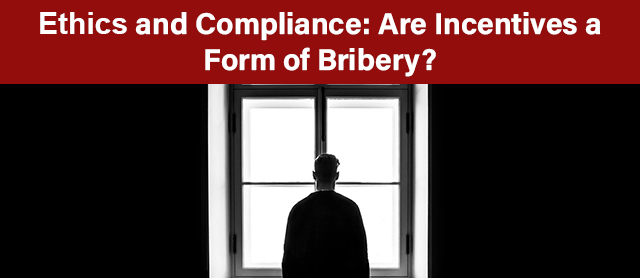With changing public sentiment regarding business, it’s important for companies to explore ethics and compliance in their use of incentive programs.
Incentives are a tool to modify behavior. An incentive program offers rewards for desired actions. Over time, those actions will be repeated more often. Non-cash incentives result in longer, more permanent changes in behavior than cash commission or verbal praise.
That’s because, based on a collaborative study between UC, Berkeley and MIT, people mentally separate rewards into two categories: social value (you can talk about it and show it off to friends) and monetary value (you can pay bills with it). Over the course of three experiments, people conclusively prioritized social value. Merchandise rewards and incentive travel fall under this category, which is why they are such effective motivators.
Incentive programs can be used to motivate a variety of behaviors: to improve sales team performance, to inspire customer loyalty, to build relational capital with B2B channel sales partners, to reward employees for displaying company values.
Structuring incentives to align with company goals is a proven way to generate ROI. But are incentive programs ethical? Is there anything underhanded about using incentives to promote company goals?
Common Objections to the Use of Incentives
Some people will point to the large bonuses certain big business executives receive to discredit the use of incentives in general. But that’s a little outside of our scope. Those are cash incentives that follow a more commission-based structure. Whether some of those are extreme or not has no bearing on the ethics and compliance of using point-based rewards or incentive travel to motivate sales reps or recognize the contributions of your B2B sales partners.
Others will argue that incentives are used to manipulate employees to work longer hours for lower pay. This is a bit of a strawman. Companies that short-change their workforce don’t usually invest in incentive programs. Most of the companies who partner with us for their incentive programs are in competitive industries with above-average compensation. They are often looking for ways to further reward and recognize the people whose contribution to their business goes beyond mere job description.
Or they will argue the opposite. If people are already getting paid to do a job, why should they get anything extra for going above and beyond? But it’s possible for someone to do a job without consistently exceeding expectations. In fact, it’s possible for someone to perform a job description while exhibiting behavior that’s damaging to organizational culture or, worse, to the long-term value of your brand.
Take property and casualty insurance sales, for instance. If an agent’s job description is to ‘sell policies,’ they can do that without being a team player. Motivated by commission, they might fail to follow up with existing clients to fill potential verticals. Or they could fail to act as a trusted advisor and sell policies that aren’t in the best long-term interests of their clients, jeopardizing future business.
Incentivizing Voluntary Behavior
What about incentives for people outside your organization? It’s possible for a distribution partner to hold up their end of the deal (or not) without taking a long-term interest in the success of your business. If you’re a manufacturing company, your industrial distribution channel partners aren’t financially obligated to recommend your product to contractors or to educate them on your newest product. Customer loyalty is voluntary. If you’re an industrial distributor, contractors aren’t financially obligated to always purchase from you and not from a competitor.
Incentive programs can be used to encourage voluntary behaviors that benefit your business, help you to gain market shares, and generate ROI.
The Ethics of Incentives
You’ll notice in the examples above, the words ‘obligated’ and ‘voluntary.’ Other words we might want to look at are ‘forced’ versus ‘motivated.’ In an article in The American Political Science Review, Dr. Ruth W. Grant of Duke University, makes an interesting distinction:
“An incentive is an offer of something of value…to alter a person’s course of action. The person offering the incentive means to make one choice more attractive than any other alternative. Both parties
stand to gain from the resulting choice.”
The emphasis is mine. Dr. Grant further makes the connection between incentives and trade. She argues that incentives are “inherently ethical,” since the action incentivized is voluntary and “will only occur if it is beneficial to both parties.”
But what if there are more than two parties involved? What if one of the parties holds a position of trust or legal duty? Doesn’t bribery become a concern? Are there other issues of ethics and compliance we need to explore?
According to the Cornell Law School, bribery is the use of gifts or payments to directly influence a person in a position of power to act in a way that goes against legal or ethical obligations. Where such conflict doesn’t exist, incentives are not bribery.
However, there are some legitimate ethical concerns in the industries of some of the clients we partner with. Earlier I mentioned insurance sales. Some of our clients work in medical and pharmaceutical sales. Others are manufacturers who build products that are used by government organizations. All of these are companies have to take ethics into account when designing their incentive programs.
Later in the article, we’ll be exploring the questions you need to ask in order to structure an effective, ethical incentive program that’s good for your business. But first, we’ll briefly address legalistic concerns.
Ethics and Compliance: Legal Precedents Regarding Incentives
The U.S. Federal government uses incentives to promote behaviors that are for the greater societal good. The U.S. government offers rewards to companies for hiring workers with disabilities, benefits and tax breaks for tech startups, tax benefits for hiring veterans, and special mortgage considerations for financing energy efficient homes.
In fact, the government specifically recommends that private corporations take a similar approach when structuring their ethics and compliance programs. Take, for instance, the following passage from the 2004 revision to the Federal Sentencing Guideline Standard:
“The organization’s compliance and ethics program shall be promoted and enforced consistently through appropriate incentives to perform in accordance with the compliance and ethics program.”
The Occupational Safety and Health Administration ruled in 2016 that workplace safety incentive programs are an “important tool” to promote workplace safety and are “always permissible as long as they are not implemented in a manner that discourages reporting.” On a similar note, a proposed law from the Department of Labor to restrict the use of incentives for insurance agents was struck down in federal court last summer.
Structuring Your Program Around Legitimate Ethical Concerns
Now that we’ve established that incentive programs are legal and ethical in concept, we need to make sure that our incentive program is structured in such a way that accomplishes its goals while avoiding any unintended consequences. For certain industries, one of the most important aspects of their brand is their ability to act as trusted advisors to their clients. Failure to do so compromises their overall integrity and the value of their brand.
For companies that work in insurance, medical and pharmaceutical sales, and manufacturers who work with the government, there are a couple of key questions we need to look at when structuring an incentive program.
-
What KPIs (key performance indicators) should we incentivize to align with company values, while still promoting growth?
For these purposes, we need to break things down into leading indicators and lagging indicators. In other words, factors that lead to success (such as better area coverage or product knowledge) versus results that measure success (such as raw sales performance). Strictly incentivizing lagging indicators can promote behaviors that might not be good for your brand long-term.
Of course, ROI is still important, but incentivizing your sales force to act as trustworthy advisors will create additional sales opportunities, resulting in long-term growth.
-
How can we incentivize employees for upholding company values? Is there a financial benefit?
Some of our clients in pharmaceutical sales don’t incentivize sales-based performance but instead reward their pharmaceutical sales reps strictly for displaying company core values. This might seem like little more than corporate fluff. But, consider this: pharmaceutical sales channels are based on relationships, trust, and product knowledge. Ethics and compliance are a huge concern in this industry.
By rewarding their reps for displaying company values, they know that these reps will be better able to navigate their sales channel and fill certain verticals in the future. These companies know that building the value of their brand will result in long-term financial growth.
-
Does the structure of our incentive program violate the best interests of our clients or channel partners?
Circling back to concerns about bribery, this is a definite consideration for some of our clients who manufacture products for government organizations. Is it OK to offer incentives to government organizations for customer loyalty, or for providing marketing insights about end-users? A lot of this comes down to the quality of the manufacturer in question. Ask yourself the following questions:
- Do we offer a quality product or service that truly benefits the government organization and the people they provide for?
- Will the government organization we work with be able to improve their offering or operate more effectively based on a longstanding business relationship with us?
- Will gaining more knowledge about our end-users allow us to better serve them in the future?
If you can answer “yes” to the above questions, not only are incentive programs ethical in this regard but not using them is doing a direct disservice to the government organization and the people they provide for. If you can’t answer “yes” to those questions, well, it might be time to go back to the drawing board and figure out why your organization isn’t up to government standards.
-
Will we be equipped to make sure that none of the incentive program participants “game” the system, and that the system operates consistently and fairly?
This might be less of a direct concern for your organization and more of a concern in carefully choosing the incentive company you partner with for your incentive program. It is important to have someone carefully monitor the behavior of the participants to make sure that everything is aboveboard. Cheating undermines the integrity of your incentive program and can result in behaviors that are detrimental to your business.
Along the same lines, it’s important to make sure that your incentive program treats everybody fairly and consistently fulfills rewards based on clearly communicated goals. This comes back to organizational integrity and the value of your brand. Incentive programs should improve communication with your internal salesforce as well as members of your distribution channel. Failure to adhere to these principles will result in dysfunction and resentment.
Moving Forward
In closing, I should note that these are considerations that businesses don’t have to figure out by themselves. Incentive Solutions—with over 30 years of experience and multiple rewards—prides itself on being a consultant to the companies who partner with us for their incentive programs. A trusted advisor to the trusted advisors, if you will.
If you’d like to continue this conversation with one of our incentive experts, call us at 866-567-7432. If you feel like your company has some special considerations regarding ethics and compliance that were not addressed in this article specifically, we’d love to have those conversations.
In the meantime, here are a couple of case studies that might be of interest:
- Manufacturer of mobility products increases warranty submissions by 249%
- Leader in casualty insurance increases quotes by 21%, boosts policy sales by 19%
Bibliography
Department of Labor logo UNITED STATESDEPARTMENT OF LABOR. (n.d.). Retrieved from https://www.osha.gov/laws-regs/standardinterpretations/2018-10-11
Grant, R. W. (2006). Ethics and Incentives: A Political Approach. American Political Science Review,100(01), 29-39.
Heyman, J., & Ariely, D. (2004). Effort for Payment: A Tale of Two Markets. Psychological Science, 15(11), 787-793. Retrieved from https://www.researchgate.net/publication/8234759_Effort_for_Payment_A_Tale_of_Two_Markets
Incentives and Financing for Energy Efficient Homes. (n.d.). Retrieved from https://www.energy.gov/energysaver/services/incentives-and-financing-energy-efficient-homes
Investopedia. (2019, March 12). The DOL Fiduciary Rule Explained. Retrieved from https://www.investopedia.com/updates/dol-fiduciary-rule/
LII Staff. (2014, November 20). Bribery. Retrieved from https://www.law.cornell.edu/wex/bribery
Mack, S. (2017, July 25). Ethical Implications of an Employee Incentive Program. Retrieved from https://careertrend.com/ethical-implications-employee-incentive-program-14920.html
Murphy, J. E. (2011, November). Using Incentives in Your Compliance and Ethics Program. Retrieved from https://assets.hcca-info.org/Portals/0/PDFs/Resources/library/814_0_IncentivesCEProgram-Murphy.pdf
Pereless, A. (2018, April 09). Why Your Company Should Be Using These Government Incentives. Retrieved from https://www.forbes.com/sites/forbestechcouncil/2018/04/09/why-your-company-should-be-using-these-government-incentives/#46af77555ec0



